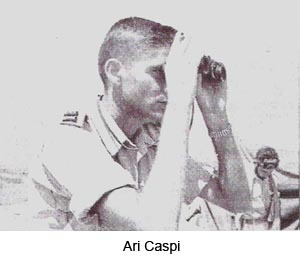 “We have got our 2nd Lieutenant”. The first time I saw him, he was standing at the side of the
road where we had fallen in line. He was wearing a black beret which indicated service in the Negev. Ari
Caspi was well over six feet tall and thin to the extent that he almost looked frail, but on a march he carried
a machine gun on his shoulder with apparently no more effort than he would a broom stick. His face
was stern and mature, and seemed to show the experiences and training he had put behind him. He
was direct and confident, but nevertheless he was no older than the average age of the boys he was
to train..
“We have got our 2nd Lieutenant”. The first time I saw him, he was standing at the side of the
road where we had fallen in line. He was wearing a black beret which indicated service in the Negev. Ari
Caspi was well over six feet tall and thin to the extent that he almost looked frail, but on a march he carried
a machine gun on his shoulder with apparently no more effort than he would a broom stick. His face
was stern and mature, and seemed to show the experiences and training he had put behind him. He
was direct and confident, but nevertheless he was no older than the average age of the boys he was
to train..
The rank of 2nd Lieutenant in the Israeli army is called Segen Mishne. If any of us addressed him directly, it should have been prefaced by “Segen Mishne Caspi”. But the term “Hamefaked” (my commander) was invariably used, and it was a form of address that barely did him justice. The boys often discussed the merits of their instructors, and not once, a recruit would say. “I would follow Caspi anywhere.” This, to say the least, expressed the confidence we had in him, and there are few other compliments a soldier can pay his officer.
Recruit training is difficult, and very often the soldier feels he is being treated like an animal or merely a number. When Ari spoke to you, you got the feeling that you were once more a human being. He took a serious interest in each of us. Very often he went much further than his duty required. Few of us will forget the party in Pardess Hanna, the visits to the peoples’ homes and the 5 day tiyul which he organised and conducted. We only knew him as our officer, but we shall remember him as a solder, leader and friend. Who can forget his answer when one of the boys on the tiyul asked him why he never smiled at the training base. “I didn’t smile because there was nothing to smile about.”
In an ambush somewhere in Sinai he fell. With him went a part of each person in our platoon, and in every person who knew him, you will find a little of Ari Caspi.
This article appeared in HULLO NACHAL No. 4 (1957)

